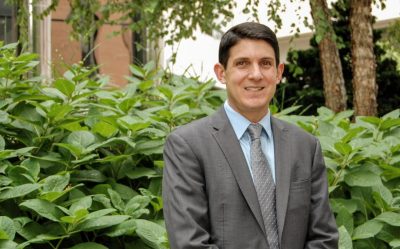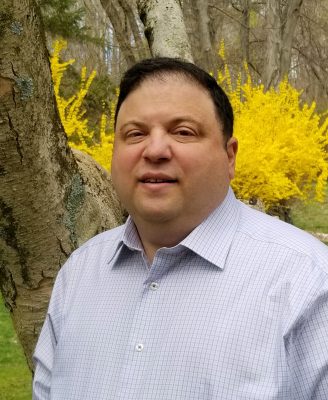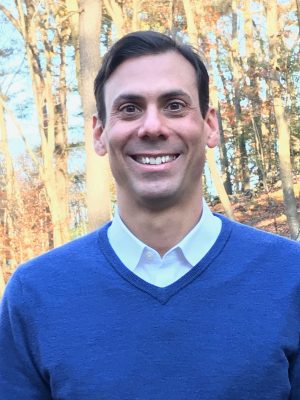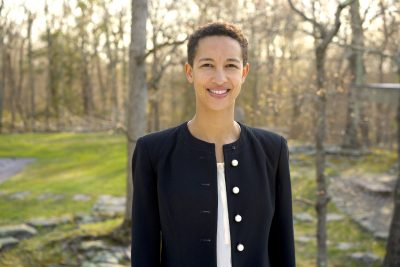Incumbent, Three Challengers Face Off in Bedford Board of Ed Race
This year’s Bedford Board of Education election features a four-candidate scrum for two seats. Incumbent Michael Bauscher, who is completing his first term on the board, runs for re-election and is facing three first-time candidates – Steven Matlin, Robert Mazurek and Namasha Schelling. Current board President Collette Dow opted against running for a third term.
Michael Bauscher

Continuing to provide thoughtful leadership as the district emerges from the COVID-19 crisis and continuing Bedford’s tradition of academic excellence has motivated Bauscher to run for a second term. That thoughtful leadership in recent years has allowed the district to manage multiple complex issues, and will help the board be a positive influence for the district.
Bauscher, 39, an attorney and Mount Kisco resident, said Bedford offers very strong and robust academic offerings and students are consistently challenged and for the most part doing quite well.
“I think there’s always room for improvement but I think looking at the data is critical to identifying where there may be continued gaps in any particular situation,” he said.
The district also has to look beyond the data and understand a complex set of factors that result in achievement gaps and making sure there is a commitment to understanding why they occur, he said. Required investments must be made to address achievement gaps.
“I think, unfortunately, COVID is going to create learning gaps not just in Bedford but across the country and the world,” Bauscher said. “I think it’s critical for all districts to quickly and effectively access where these gaps are and quickly and effectively come up with solutions to close these gaps as soon as possible.”
Bedford has proposed adding additional sections where possible in each building to ensure smaller class sizes, Bauscher said to have more effective teaching and learning. It would also allow teachers to focus more on the social and emotional well-being of students, which is a key portion of the COVID-19 recovery in schools, he said.
Bauscher said he was proud of how the district, particularly the faculty and staff, handled the unprecedented challenges presented by the pandemic.
“I think our commitment to the one-to-one Chromebook program. even before COVID allowed us to put Chromebooks in the hands of all of our students, and allow access districtwide to remote learning (was important),” he said.
The district also took steps to provide internet hotspots for those families who needed more reliable online access, Bauscher added.
Furthermore, he said the district’s preparation last summer allowed Bedford’s K-2 students to return to in-person instruction full-time in September and provide strong remote learning for the rest of the students despite the challenges.
While in-class instruction is considerably more desirable, the lessons learned about remote learning over the past year may help the district with potentially implementing in certain future programs, Bauscher said.
The lack of any type of fiscal stress for Bedford schools over the last two years represents outstanding progress, Bauscher said. The district was forced to lay off more than 50 staff members in 2015-16.
It highlights the board’s commitment to responsible budgeting and proper use of reserves, employing incremental growth strategies and spending within the district’s means.
“I think in order to maintain that I think we need to continue to strike a responsible balance between expanding our programs and opportunities for students in a strategic way while also being cognizant and aware of the need to maintain healthy and sufficient reserves to protect against future financial downturns,” Bauscher said.
Bauscher said he’s encouraged by the steps taken by the district this year to support true inclusion, diversity and equity for all populations, but more meaningful action is also needed to ensure all students and staff have the chance to thrive.
The district can do more in evaluating its practices, procedures and policies to ensure the district won’t tolerate overt discrimination. Addressing the impact of implicit biases is also needed, he said.
Focusing on greater diversity when making hiring decisions is also crucial.
“It’s critical to have a faculty and staff that represents the community that it serves,” Bauscher said.
Bauscher said he is pleased where the Dual Language Bilingual Education program is heading and that the district was able to implement the school of choice option in his first year on the board. It has provided equal opportunities for all students across the district but also gave parents who wanted their children enrolled in a traditional program to be supported as well.
In a second term, Bauscher said he will strive for better communication and public relations to more effectively inform the community on issues and advertise the district’s many successes.
Steven Matlin

Matlin said he is running for the Board of Education to make sure that the learning gap created by the global pandemic is properly addressed for all students. He also wants to see the board remain focused on issues related to education rather than getting sidetracked.
Discussion of closing one or two elementary schools to save money, which was widely opposed by the community and eventually dropped, and exploring conversion of part of the West Patent Elementary School grounds into a solar farm diverted too much attention.
“Now more than ever we need to be laser-focused on our children,” said Matlin, 51, a corporate attorney and Bedford resident who served on the district’s Budget Advisory Committee. “We have really one chance to address these social and emotional issues created by the global pandemic and we have to get it right. If we don’t, the consequences are too great.”
Matlin said the administration did an admirable job in steering the district through the COVID-19 crisis in an impossibly difficult situation. The district did well to return its K-2 students to school full-time at start of the school year, but the board could have done more to try to bring back the rest of the students from a full remote or hybrid model before Apr. 12, he said.
He was also skeptical of remote learning going forward.
“Our kids need to be in the classroom for so many reasons – academically, socially, emotionally,” Matlin said. “It’s also where our amazing teachers can do their best work. For me, it’s always about providing the best education we can for our children.”
Matlin said Bedford is still an excellent school district with excellent teachers, but his focus if elected to the board would be to improve educational outcomes.
“Our children deserve much better than what we’ve been doing for them recently,” he said. “We’ve done it before, there’s no reason why we can’t do it again.”
One of Matlin’s main areas of focus would be special education. Too many parents with students with Individualized Education Program have related their concerns to the board.
While the district has markedly improved its fiscal situation over the last five years, Matlin said an area that remains lacking is longer-term financial planning. An undesignated fund balance of about $5.7 million, which is in excess of the 4 percent threshold set by the state, may appear to be an advantage for the district, but it also means that Bedford isn’t spending the money where it should be going – on the students’ education.
“We need to financially forecast five years out so there are no more surprises and that money we have is spent where it needs to be, which is in the classroom,” Matlin said.
Gradual increases in state Foundation Aid over the next few years was welcome news for Bedford and districts throughout the state, he said. Matlin believes that any extra money should not only be devoted to the classroom but to expand arts, music and athletics, including adding freshman sports and assistant coaches.
“We can invest in the entire student to provide a well-rounded education,” Matlin said.
Matlin said making the schools as welcoming as possible for all students must always be the goal. That includes making diversity, inclusion and equity not only about race but about students across the spectrum because inclusion is vital.
“When students are comfortable and happy in school that’s when they thrive,” he said. “We need to commit to do that for all students.”
Matlin is running with fellow Robert Mazurek because he said their philosophies mesh and they feel they are the two best candidates for the job.
“This is a big job and this is something that you need to have some experience in to be able to do it,” Matlin said. “I admire anybody who’s willing to volunteer for the job. I just think experience matters and it’s more important than ever.”
Robert Mazurek

Mazurek has served on the district’s Budget Advisory Committee, and as a financial analyst he said he has the critical thinking skills to help the community on the Board of Education.
Fiscal issues may be the most significant reason behind his candidacy.
“I have knowledge of the departments and the different lexicon and those kinds of nuances of state regulations and the rest of it, and so I can apply my professional skills (to the board),” Mazurek said.
With Bedford being such a large district geographically while educating about 3,900 students and managing a roughly $140 million operating budget, there needs to be more professional oversight from the board, he said. There also needs to be more coordination with the district’s committees and better planning.
“Prioritization, accountability, focus on outcomes and right now we have a really good opportunity post-pandemic to be optimistic, to reinvest and I think I can help them,” said Mazurek, 51, a Bedford Hills resident.
One of the key reasons for the district extricating itself out of the 2015-16 fiscal mess is declining enrollment, he said. However, the lack of a five-year financial plan, which many districts have, is glaring. The overflowing reserves, which all sources are counted stands at about $20 million, and the district’s inability to direct more of that to the classrooms is due to a lack of planning, according to Mazurek.
The focus for the district moving forward with any extra funds from the increased state Foundation Aid and federal money from the American Rescue Plan is a bolder vision to enhance academic programs, Mazurek said.
“We really need to know now many students fell behind and then we need to plan to address that, if there are special services there, we need to provide them,” Mazurek said. “Let’s be really optimistic, let’s be really bold. Let’s spend the money that we have, whether it’s from the Foundation Aid or the surplus that we have, to reinforce our schools. Let’s have an exciting time, be engaged in the academics and all sorts of extracurricular activities.”
Given the surpluses, the current board allocated only about $265,000 in those types of extras, which is inadequate, he said.
Academically, Mazurek said Bedford has many qualities in its favor, but he would like to identify what he described as the outliers, the areas that need improvement, and address those areas. That systematic approach is missing on the board, he said.
He gave the district good marks for its handling of the uncertainties of instruction through the pandemic, particularly during the current school year. The district’s emphasis was safety first, which was achieved, he said
The question is what happens next year and beyond. Mazurek said many students are resilient but others have fallen behind during the past year.
“We have to look ahead and help those that are struggling and right now and next year as well and we have to support our parents and teachers and get them some R&R,” Mazurek said.
As the father of mixed-race children, Mazurek said his personal experience is that Bedford provides an accepting and welcome environment. Even if there is just one case of discrimination, it is one too many.
With its large Latin community, Mazurek said the district can do a better job engaging those students at the secondary level. Perhaps making it more appealing to attract students through extracurricular activities and sports could help integrate them more with the rest of the school population.
“I just want to emphasize that we have an opportunity here and we should be optimistic, we should be bold, we should highlight programs that succeed for the full student experience,” Mazurek said.
Namasha Schelling

Schelling is a relative newcomer to the district, having moved to Pound Ridge with her husband three years ago. In that time, Schelling has been drawn to public service, contributing to the town’s Comprehensive Plan Committee, the Housing Board and the Criminal Justice Reform Committee and serving on the Inclusion, Diversity and Equity Committee in Bedford.
Her first foray into the schools was accepting an appointment to the Student Achievement Advisory Committee. What Schelling, 37, the mother of a two-year-old daughter who has spent most of her career working with nonprofits, saw up close was a lack of diversity on the current board, particularly for a district where about 45 percent of its students are minorities. It was part of the impetus for her to run for the Board of Education, she said.
“But I also see a district that is striving to better serve our broad and diverse community, and I’m just really doing everything I can to try and support that effort, and I feel like it’s the right time and the right place for this, where we are in our community and country today,” Schelling said.
The issue of diversity and accepting all students is critical for Schelling. Born in Tanzania, her father is Swiss and her family moved to the United States. Her father worked for the World Bank in Washington.
Her family eventually returned to Tanzania and Europe, but Schelling stayed and became a citizen in 2014.
“I came here when I was 10, so I think I can respect the immigrant experience a little bit as well,” Schelling said.
She commended the board for issuing an anti-racism value statement last year, what Schelling described as “a very important first step” and a much-needed recognition that racism exists in the district, which must be addressed.
“A lot of people I’ve talked to are concerned that a lot of their work is dependent on who’s on the Board of Education currently,” Schelling said. “We shouldn’t allow that to happen. We really need to make sure that there’s a commitment to that and we’re open and transparent in what that means.”
Schelling said she wants to see a Diversity and Inclusion Committee and hire a consultant to provide strategic planning within the district to move certain initiatives forward.
For Schelling, how the district, which has about 650 English Language Learners, provides a more inclusive school environment for everybody is key.
“They are committed to this work and our greatest strength in this district is our diversity, but it’s also our greatest challenge, and we must meet this challenge,” she said.
Only about 13 percent of the district’s teachers are Black or Latino, a number that is consistent with most of Westchester outside of Yonkers, Schelling said. The larger issue is how to attract more minorities into teaching, she said.
Schelling, who grew up trilingual, applauded the district for its Dual Language Bilingual Education program, which has been tweaked. She wants the district to focus on the program and hopefully expand it in the future.
“It’s a real shining example of what our district can do, because honestly, the people who are coming here from New York City, they would love to have a dual language program for their children,” Schelling said.
She said the district has room for improvement academically, but considering Bedford’s challenges it’s also doing well. Residents and parents shouldn’t be comparing the district to some of its neighbors that don’t face the issues of a large immigrant population and poverty.
“We’ve got to communicate this better to the community, so the focus isn’t lonely on test scores,” Schelling said.
Getting Chromebooks out to every student last spring within a few weeks of the shutdown was a major accomplishment, she said, despite the large learning curve for remote learning for teachers and students.
Schelling is pleased that the district will be offering some summer school programming and should focus on helping those experiencing a learning gap over the next two to three years.
School officials have done a strong job improving the finances of the district, and she was pleased that the board decided to go under the tax cap for the second consecutive year, although that will not be sustainable every year. They have balanced the fiduciary responsibilities to the taxpayers and the students quite well, Schelling added.
More effective communication is needed to get the message out about what the district is doing, Schelling said, not only for the families with children in the schools, but everyone.
“They’re all taxpayers and how do we work effectively together to have quality public schools and communicate that as a need in our community and keep property values high,” Schelling said. “We have to be honest about our intentions, and yes, work together.”

Martin has more than 30 years experience covering local news in Westchester and Putnam counties, including a frequent focus on zoning and planning issues. He has been editor-in-chief of The Examiner since its inception in 2007. Read more from Martin’s editor-author bio here. Read Martin’s archived work here: https://www.theexaminernews.com/author/martin-wilbur2007/
